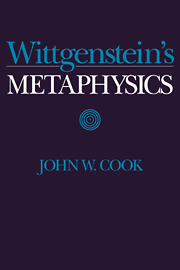Book contents
- Frontmatter
- Contents
- Preface
- List of Abbreviations
- Introduction
- Part I From Idealism to Pure Realism
- Part II The Metaphysics of Wittgenstein's Later Philosophy
- Part III Causation and Science in a Phenomenal World
- Part IV Logical Possibilities and the Possibility of Knowledge
- 14 Logical Possibilities and Philosophical Method
- 15 The Search for a Phenomenalist's Theory of Knowledge
- Part V The Past, Memory, and The Private Language Argument
- Name Index
- Subject Index
14 - Logical Possibilities and Philosophical Method
Published online by Cambridge University Press: 05 November 2011
- Frontmatter
- Contents
- Preface
- List of Abbreviations
- Introduction
- Part I From Idealism to Pure Realism
- Part II The Metaphysics of Wittgenstein's Later Philosophy
- Part III Causation and Science in a Phenomenal World
- Part IV Logical Possibilities and the Possibility of Knowledge
- 14 Logical Possibilities and Philosophical Method
- 15 The Search for a Phenomenalist's Theory of Knowledge
- Part V The Past, Memory, and The Private Language Argument
- Name Index
- Subject Index
Summary
In the Tractatus Wittgenstein said: “What can be described can also happen” (TLP, 6.362). As we saw in Chapter 12, he intended the phrase “what can be described” to include metaphysical nightmares – bizarre events such as one might find in fairy tales or in the telling of dreams. Did he continue to hold this view? Many passages in his later writings suggest that he never abandoned the view that metaphysical nightmares could actually occur. The following passage from Zettel plainly suggests this:
It is easy to imagine and work out in full detail events which, if they actually came about, would throw us out in all our judgements.
If I were sometimes to see quite new surroundings from my window instead of the long familiar ones, if things, humans, and animals were to behave as they never did before, then I should say something like “I have gone mad”; but that would merely be an expression of giving up the attempt to know my way about (Z, §393).
Consider also the following passage from On Certainty:
What if something really unheard-of happened? – If I, say, saw houses gradually turning into steam without any obvious cause, if the cattle in the fields stood on their heads and laughed and spoke comprehensible words; if trees gradually changed into men and men into trees. Now, was I right when I said before all these things happened “I know that that's a house” etc., or simply “that's a house”? (OC, §513).
- Type
- Chapter
- Information
- Wittgenstein's Metaphysics , pp. 207 - 220Publisher: Cambridge University PressPrint publication year: 1994



